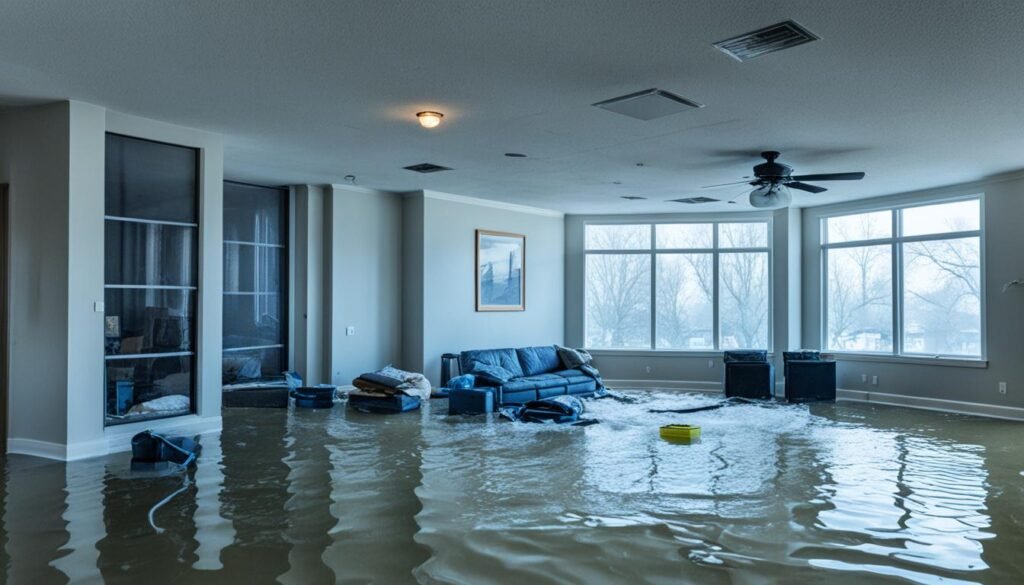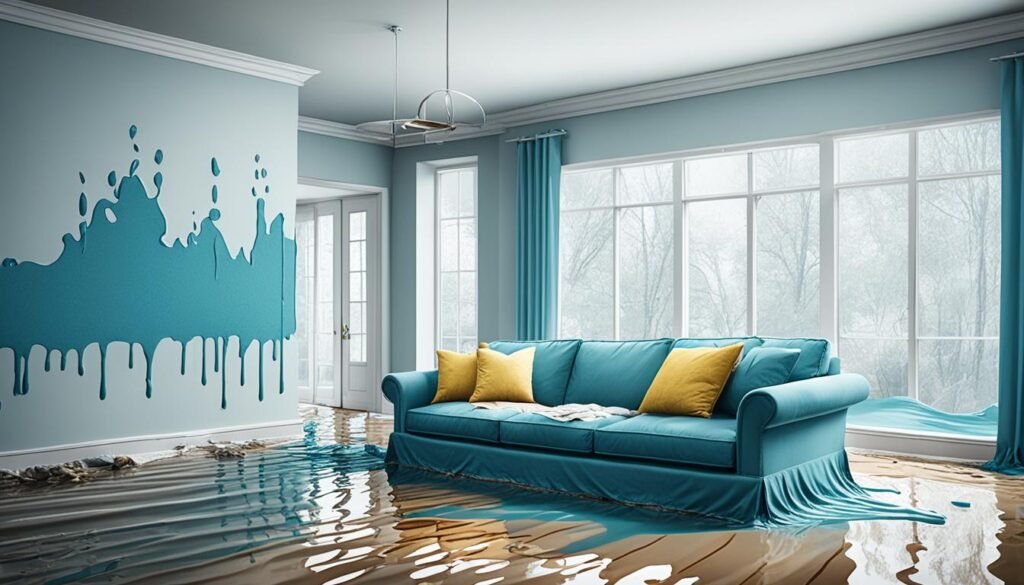Did you know that water damage claims make up over 50% of all insurance payouts for condos? This fact shows how important it is for condo owners and associations to know who pays for water damage. Figuring out who is to blame can be tricky, but it’s key to protect your investment and avoid big disputes.
Key Takeaways
- Identifying the specific components damaged is crucial for determining responsibility.
- Reviewing the condominium’s declaration and map can provide insight into maintenance and repair obligations.
- Negligence or insurance policies may shift the cost of water damage repairs to a responsible party.
- Proactive communication and a clear understanding of the governing documents are key to resolving water damage disputes.
- Seeking professional guidance can help navigate the complexities of water damage liability in a condominium.
Determining Responsibilities for Water Damage in Condos
When dealing with water damage in a condo, the first step is to figure out what got damaged. This helps decide if the condo owner or the condo association is responsible. Knowing what needs fixing is key to seeing who should take care of it.
Identifying the Damaged Components
Look closely at the water damage. Is it just the carpet, or did it reach the drywall, furniture, or even the subfloor? Figuring out what got damaged helps you know what repairs are needed and who should do them.
Reviewing the Declaration and Condominium Map
The condo declaration, or CC&Rs, tells you about unit boundaries and who does what for maintenance. It says if something like a balcony or plumbing is part of the unit or a common area. Condo owners might have to keep certain common areas in good shape, even if they’re not inside the unit.
If the declaration is unclear, the condo map can help. It shows the property’s layout and where unit lines are. If the declaration and map don’t make it clear, the rule of thumb is to see if the damaged part is inside or outside the unit.
By pinpointing what got damaged and looking at the condo rules, you can figure out who should handle condo water damage disputes, water leak liability in condos, and condo plumbing issues liability. Knowing this is key to getting things fixed fast and by the right person. It helps avoid water damage in condos and reduces condo owner vs association water damage responsibility issues.
who is responsible for water damage in a condo
Figuring out who pays for water damage in a condo is tricky. It depends on where the damage came from and the condo’s rules. condo insurance coverage for water damage is key in deciding who pays.
First, find out what got damaged and see if the condo or the owner should fix it. This info is in the condo’s declaration and condominium map.
If the damage was the association’s fault, they might have to pay for repairs. FloodFixers, a top water damage fixer, can check how bad the damage is and who should pay.
- Negligence: If someone was careless, they might have to pay for fixes, even if they’re not usually in charge.
- Insurance: Some condo insurance covers water damage, based on the policy details. Experts in More Nova Valley can help with insurance claims.
“Determining responsibility for water damage in a condo requires a careful examination of the governing documents and the specific circumstances surrounding the incident.”
Sometimes, it’s hard to say who is to blame. You might need to talk things out or go to court. Getting help from a pro, like a property manager or FloodFixers, can make things clearer and make sure the right person pays.

Conclusion
Figuring out who pays for water damage in a condo takes several steps. First, you need to see what got damaged. Then, look at the condo’s rules to know who should fix things. Sometimes, insurance or someone’s mistake can change who pays.
It’s smart to talk to a lawyer from the condo association to get it right. They can help make sure the correct person pays for the repairs.
Dealing with water damage in a condo can be tricky. But, if you look into it and get advice, you can make sure the right one pays. Knowing your rights helps you handle this better and keeps the cost down.

